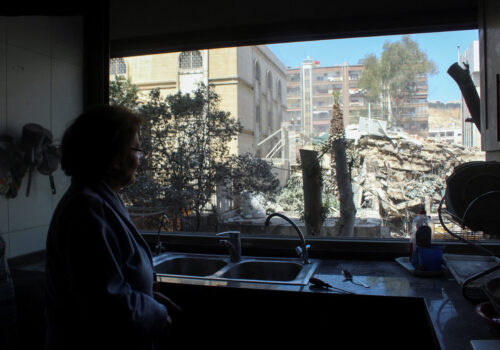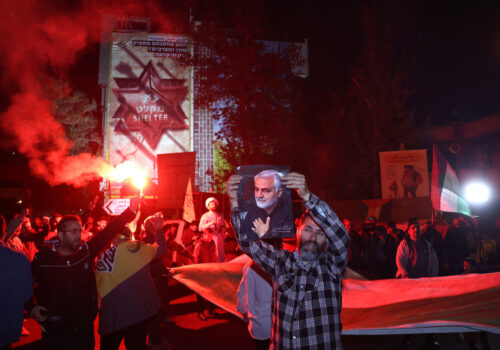Jordan took out Iranian munitions over its airspace. Now it has tensions with its people and Iran.
Jordanians were shocked to look outside their windows late at night on April 13 and see balls of fire in the sky and remnants of drones crashing across the country. In the lead-up to the news breaking, Jordan had closed its airspace as a precautionary measure, and the Jordanian Air Force reportedly shot down dozens of Iranian drones headed for Israel. The Islamic Republic of Iran fired more than three hundred missiles and drones at the Jewish state after an Israeli airstrike killed two Iranian generals and others in Damascus nearly two weeks earlier. On April 14, Jordan’s cabinet confirmed that it had intercepted flying objects crossing the country’s airspace, while offering few additional details.
Former Jordanian Foreign Minister Marwan Muasher explained that downing the Iranian drones was designed to “prevent an escalation” and was in the country’s strategic interests. A full-scale Iran-Israel war would likely harm the Hashemite Kingdom, which is squeezed between the two more powerful adversaries.
Ordinary Jordanians offered a mixed reaction to the dramatic move. “A Jordanian who loves his homeland should rejoice that Jordan has the ability to intercept Iranian drones and ballistic missiles,” Madallah Nawarseh, a Jordanian activist, said on X (formerly Twitter). “This means that we are a country that possesses strong military capabilities and can defend its borders and airspace from Iran.”
SIGN UP FOR THIS WEEK IN THE MIDEAST NEWSLETTER
However, others were more critical. In addition to Amman authorizing France to use its military base in Jordan to down the Iranian drones, NBC News reported that the Hashemite Kingdom also permitted Israeli fighter jets to enter Jordan’s airspace and intercept the Iranian missiles.
“Jordanian airspace is supposed to be closed for American and Israeli warplanes,” veteran Jordanian journalist Lamis Adnoni posted on Facebook. “Hey, people who are above, [Jordanian government] for a reminder—Israel is the enemy.” Former Jordanian Information Minister Taher al-Adwan also expressed discomfort with the downing of Iranian missiles over Arab territory. In an apparent rebuke of the Jordanian government, Adwan charged that it allowed the “infringement of Arab sovereignty, dignity, land, and skies to every foreigner or non-Arab seeking influence.” As frustration against Jordan intensified, a satirical image spread on X of King Abdullah donning an Israeli army uniform. Some online activists even claimed that Princess Salma—a pilot in Jordan’s Air Force—shot down Iranian drones, but this rumor was debunked.
The Jordanian government sought to refute such accusations of protecting Israel. Foreign Minister Ayman Safadi said that Amman has a long-standing policy of intercepting any missile that violates the Hashemite Kingdom’s airspace, irrespective of the country of origin. The top Jordanian diplomat also demanded that Israel not retaliate following the Iranian barrage and harshly rebuked Israeli Prime Minister Benjamin Netanyahu.
Safadi’s comments were aimed at better attuning the Jordanian government’s actions with popular sentiment. Many Jordanians were already frustrated with Abdullah for maintaining diplomatic relations with Israel despite the soaring Gaza death toll. The Iranian drone barrage, and the subsequent decision to shoot the drones down, added further strain between the Jordanian government and the country’s populace, which largely supports the Palestinian struggle. With unemployment in the Hashemite Kingdom soaring to about 22 percent, Jordanian authorities are not interested in creating additional tensions with the public.
Yet, Safadi’s critiques did not lessen the joy shared by some Israelis, who lauded Amman for neutralizing the Iranian threat. “Israel should give full thanks to King Abdullah and the kingdom’s army for their part last night in stopping the attack,” Member of Knesset Meirav Cohen posted on X.
Jordan’s downing of Iranian drones was noteworthy because Amman was one of the harshest critics of Israel’s war in Gaza and recalled its ambassador from Tel Aviv in November 2023. Safadi said that month that the 1994 peace treaty with Israel was collecting “dust” and Prime Minister Bisher Khasawnah spoke of a possible war with Israel. Yet, when the Jewish state needed the most help during a moment of vulnerability in the face of the largest-ever Iranian attack, Jordan’s armed forces took concrete action to save Israeli lives. The Hashemite Kingdom neutralizing the Iranian threat demonstrated that military ties between the two neighbors remain strong even as Abdullah is often upset with Netanyahu’s policies.
Such close Israeli-Jordanian security cooperation was exactly what Iran sought to avoid. The semi-official Fars News Agency cited an “informed source” in the Iranian military warning that Tehran is “carefully monitoring the movements of Jordan during the punitive attack against the Zionist regime, and if Jordan intervenes, it will be the next target.”
Naturally, the Hashemite Kingdom was not pleased with Iran’s threat. On April 14, the Jordanian Foreign Ministry summoned the Iranian ambassador to Amman for a reprimand over the Islamic Republic’s repeated “insults.” Tensions with Tehran were already elevated earlier in April as Kataib Hezbollah, an Iranian-backed militia in Iraq, threatened to supply twelve thousand fighters in Jordan with rockets and explosives to fight Israel. A Jordanian security official rebuked the announcement for “stoking tensions.” Abdullah has no interest in an Iran-backed foreign militia operating in the Hashemite Kingdom, weakening the Jordanian security services’ control over the state and inviting possible Israeli military reprisals. Only a few months ago, an Iran-backed militia launched a drone attack that killed three US soldiers and injured more than thirty in northeast Jordan.
This month’s Jordan-Iran rift only deepens decades-long tensions between the two nations, despite both countries sharing the same temporary goal of an end to Israel’s military campaign in Gaza. In January, the Hashemite Kingdom launched airstrikes against Iran-linked drug smugglers in southern Syria. A few years earlier, King Abdullah said in an interview that drones with an “Iranian signature” had previously attacked Jordan. Most famously, the Hashemite leader warned in 2004 of a “Shia Crescent,” with Iran expanding its influence over Jordan’s neighbors Iraq, Syria, and Lebanon. In December 2004, Jordan’s embassy in Baghdad was bombed, killing nine people. In his memoir, Abdullah blamed a “well-known” Shia political group with backing from the Islamic Revolutionary Guard Corps (IRGC) for the attack.
Only hours after Jordan downed Iranian drones, Abdullah received a call from the White House. President Joe Biden told the Hashemite leader that he “strongly condemned” Tehran’s attack that threatened Jordan. With Washington laser-focused on stopping Iran’s aerial assault against the Jewish state, Abdullah understood the need to reinforce his alliance with Jordan’s largest donor. Iran placing Amman in this awkward spot—having to either face ridicule among some Arabs by intercepting the missiles or snub his top ally and allow the attacks to strike Israel from the kingdom’s airspace—only bolstered Jordan’s long-standing suspicion of Tehran.
Aaron Magid is the host of the podcast On Jordan. A former Amman-based journalist, his articles on the Hashemite Kingdom have appeared in Foreign Affairs, Foreign Policy, and Al-Monitor. Follow him on X: @AaronMagid
Further reading
Wed, Apr 3, 2024
Jordan was already walking a tightrope. Then the Gaza war happened.
MENASource By
Around six months into the war, many Jordanians have not been satisfied with their government’s response to the Gaza war.
Fri, Apr 5, 2024
Most GCC states condemned the attack on the Iranian embassy complex in Syria. An escalation is what they fear most.
MENASource By
Fearful that hostilities between Israel and Iran could spiral out of control, the GCC states are keen to avoid the heat as much as possible.
Sat, Apr 13, 2024
Experts react: Iran just unleashed a major attack on Israel. What’s next?
New Atlanticist By
What will Israel do next? Has a wider regional war begun? What role will the United States play? Our experts weigh in below.
Image: An Iranian man is holding a scale model of a cannon shell during a celebration in support of Iran's IRGC UAV and missile attack against Israel, in downtown Tehran, Iran, on April 14, 2024. Iran is launching dozens of Unmanned Aerial Vehicles (UAVs) and missiles against Israel in response to the Israeli attack on its Consulate in Damascus. (Photo by Morteza Nikoubazl/NurPhoto)


